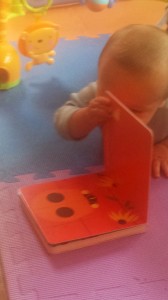 I am learning to listen from my grandson. (And if my son his father tells you it’s ‘indulging him,’ disregard.) I am learning to pay attention to cues — both verbal and non-verbal. And remember: at a scant six months, ‘verbal’ does not include words. 🙂
I am learning to listen from my grandson. (And if my son his father tells you it’s ‘indulging him,’ disregard.) I am learning to pay attention to cues — both verbal and non-verbal. And remember: at a scant six months, ‘verbal’ does not include words. 🙂
Still, Trinidad is quite articulate. And he makes his wants known. IF you listen. He greeted the older woman at the table next to us at lunch. Following her ‘Hi!’ was what sure sounded to both of us like a responding ‘Hi!’ Pronounced more like ‘Hah!,’ but who’s going to be so picky?
And when he turns the pages of his new board book, and babbles happily, why can’t I tell him what a smart reader he is? Who’s to say he isn’t mimicking his mother, father, grandmother with their beloved books? What can I remember of being a baby, myself? Who is able to fathom what we know, and when — and how — we learn it?
with their beloved books? What can I remember of being a baby, myself? Who is able to fathom what we know, and when — and how — we learn it?
Babies begin understanding language, according to research, around six months. And language is complex. Actions? Most mammals understand actions. I’m betting on Trin, myself. I think if I listen, I’ll be able to learn the language of Trin: his gestures, his verbalisations, what he’s trying to tell me. Because I think that like most of us, he has a lot to say. If you just pay attention.
It’s something I’m carrying out into my public life, this lesson from Trin. Confession time: I interrupt. A LOT. It’s my family culture! You would NEVER get a word in edgewise w/ my three sisters if you didn’t interrupt.
But it’s not the way I want to live my life, at least not intentionally. And increasingly? I want to live w/ intention. Good intention. 🙂 Which means: I’m listening to Trinidad. And that’s a start.

